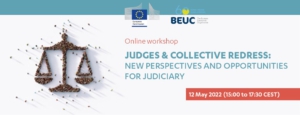Views
Nothing Found
Sorry, no posts matched your criteria
News
Online Seminar BEUC Judges & Collective Redress
Judges & collective redress:
new perspectives and opportunities for judiciary
Thursday 12 May 2022, 15:00 to 17:30 CEST
This online event will be held in English and is reserved for judges and members of judiciaries.
>>> REGISTER HERE <<<
Judges may play an important role in collective redress actions following mass harm situations. Mass harm situations refer to cases where a number of persons are harmed by the same illegal practices relating to the violation of their rights by one or more traders or other persons. Collective redress actions may seek the cessation of such practices and/or compensation. The fact that such disputes concern large numbers of persons raises specific procedural challenges but also offers opportunities in terms of efficient administration of justice.
In the context of the EU’s Representative Actions Directive, which will come into application in June 2023, judges will be called upon to undertake specific tasks. Depending on the national rules transposing the Directive, they may be required to assess the admissibility and merits of the actions, to ensure that consumers are appropriately represented and informed, to verify that the interests of all represented parties are well-protected, etc. The objective of this workshop is to raise awareness on collective redress and to exchange on the roles of judges in collective redress actions.
During a panel discussion, three judges with recognised expertise in the field of collective redress will share their insight and experience:
Mr. Fabian Reuschle (judge at the Stuttgart Regional court – Landgericht – Germany). Fabian Reuschle actively participated in the adoption of the German Capital Markets Model Case Act (KapMuG) establishing a lead case procedure for the collective handling of capital market-related actions.
Sir Peter Roth (judge at the London High Court & UK Competition Appeal Tribunal). Sir Peter presided over a collective litigation against MasterCard lodged on behalf of 46 million consumers.
Mr. Jeroen Chorus (retired judge, formerly at the Amsterdam Court of Appeal, the Netherlands). Jeroen Chorus was notably in charge of the Dexia and Shell mass settlement with consequences on consumers in multiple European jurisdictions.
Programme:
| 15:00-15:05 | Welcome |
| 15:05-15:15 | Setting the scene: What does collective redress mean for judges? (Stefaan Voet, KU Leuven University) |
| 15:15 – 16:30 | Panel discussion with:
Panel moderated by Maria José Azar-Baud (University of Paris-Saclay, France) & Ianika Tzankova (University of Tilburg, the Netherlands) |
| 16:30-17:15 | Questions & Answers session with the audience (moderated by Magdalena Tulibacka, Oxford University, UK/Emory University – United States and with the participation of the representatives of the Directorate-General for Justice & Consumers of the European Commission |
| 17:15-17:30 | Concluding remarks |
This project is funded by the European Union.
Attendance to the event is free but registration is mandatory. The number of registrations is limited. Therefore, please register as soon as possible via the following link.
For questions, please contact us.
The Effect of Choice of Court Agreements on Third Parties: Lecture by Professor Yeo Tiong Min
The Yong Pung How Professorship of Law Lecture 2022 will be held online on Wednesday 25 May 2022 at 5:00 to 6:30pm Singapore time. The speaker, Professor Yeo Tiong Min, SC (Hon), who holds the Yong Pung How Professorship of Law chair at the Singapore Management University, will speak on ‘ The Effect of Choice of Court Agreements on Third Parties’. The synopsis for the talk is as follows:
“The effect of choice of court agreements on the exercise of jurisdiction of the Singapore court between contracting parties at common law has received clarification in Singapore law in recent years. The position is also clear under the SICC Rules and the Choice of Court Agreements Act. The effect on third parties is less clear. In this lecture, the effect of choice of court agreements on the position of third parties under the legal regimes above will be considered, from the perspective of both conflict of laws and the Contracts (Rights of Third Parties) Act in domestic Singapore law.”
Attendance at the webinar is complimentary. More information and the link to register can be found here.
Munich Dispute Resolution Day on 6 May 2022: Human Rights Cases before Civil Courts and Arbitral Tribunals in Germany
by Wolfgang Hau, University of Munich
This year’s Dispute Resolution Day of the Munich Center for Dispute Resolution on 6 May is dedicated to the above mentioned highly topical issue: Can companies in Germany be held responsible for human rights violations that have occurred somewhere in the global supply chain? Are civil lawsuits and commercial arbitration at all suitable for enforcing international human rights obligations of business enterprises? Such and related questions will be examined and discussed by renowned speakers. The conference will be held in German at the University of Munich. You can find the programme and registration information here:
https://www.mucdr.jura.uni-muenchen.de/munich_dispute_resolution_day/drd-2022-flyer.pdf



